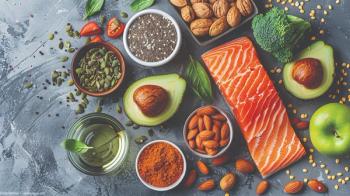
- April digital edition 2020
- Volume 12
- Issue 4
How to build a lifestyle and nutritional firewall against viruses like COVID-19
Have a plan to combat immune senescence in your senior patients at risk for the disease
At the Ocular Wellness and Nutrition Society,1 we teach our members how to build a firewall of immune protection for patients, eyecare providers, and their families.
Humans have lived and survived severe acute respiratory syndrome (SARS, 2004), avian flu (2008), swine flu (2010), Middle East respiratory syndrome (MERS, 2012), Ebola (2014), Zika (2016), and Ebola part deux (2018). Now COVID-19 is the new challenge.
Related:
Each flu season, tens of thousands die, especially those with pre-existing health challenges (smoking, obesity, diabetes, cancer, and more.) Yet as of this writing, we have seen only 302 U.S. coronavirus deaths.
For the United States, there remains an “unknown denominator” because reliable testing kits were largely unavailable during the first 4 months of the COVID-19 outbreak. That is, a small percentage Americans, thus far, have been tested for the pathogen.2 Regardless of the potential for increased virulence, resistance and proliferation of this virus, following government recommendations for social distancing and hygiene will of course buy us time and “flatten the curve.” However, optimizing the immune system by reducing fear and stress, and improving lifestyle while optimizing nutrition is more important than ever.
Related:
Immune processes and adjustment behaviors powerfully regulate each other.3 Thus, it is plausible that healthy food, quality sleep, sunshine, exercise, music, meditation, pets, and supplementation result in improved immune performance. Conversely, stress has been shown to lower immune competence in patients with cancer.4
Related:
Meta-analytic reviews have summarized results from the large number of studies using the “stress/non-stress” paradigm, revealing consistent immune changes in the presence of psychological stressors.5-8 Overly stressed individuals exhibit poorer sleep, exercise less, and have poor dietary habits, as well as habitual drug and alcohol use, all of which depress immune competence.5-8
Central activation of the sympathetic nervous system, even via non-adrenomedullary pathways such as sleep deprivation, has been shown to have a pivotal role in the regulation of inflammation and innate immunity in astronauts in hyper-stressed environments.9 We know that the brain controls immune responses. Stress also increases the need for vitamin C from the diet or supplements.10
Related:
Build natural immunity
Even in the polluted Chinese city of Wuhan and surrounding environment, it is reported that 81 percent of individuals who were infected had only mild disease: non-pneumonia and mild pneumonia.11 The good news is that Americans are likely already developing antibodies on their own without the aid of a vaccine.12 Functional foods and dietary supplements may enhance this natural immunity to overcome immune senescence.
Related:
Improve immunity by reducing simple sugars from the diet, from soda, fruit juices, candy, and cake. Choose nutrient-dense plant food, vegetables and vegetable juices and vitamin C/bioflavonoid-containing fruits. Sugar feeds bacteria that grow, like strep, so avoid secondary infections.
Sunlight and vitamin D3
The potential for co-infection is always present. The over-arching governor is the Earth in winter solstice tilting away from the sun with our immune system crashing. It is then that infectious disease erupts. Mass vitamin D nourishment is preferred, from vitamin D rich foods such as cold-water fish (like sardines or salmon) and mushrooms. However, fish alone in the absence of sunlight might not significantly raise vitamin D blood levels. Therefore, evaluate and optimize patients’ 25 OH vitamin D liver reserve status with a blood draw or finger blood spot test.
Related:
Protective effects of vitamin D are strongest in individuals with profound vitamin D deficiency at baseline, although those with higher baseline 25(OH)D concentrations also experience benefit according to meta-analysis studies.13
House-bound elderly patients of color, those living in northern latitudes or not exposed to natural sunlight, and at-risk patient such as smokers, the obese, and patients with pre-existing conditions such as diabetes and heart disease are the patients to be concerned about.13
Related:
Zinc lozenges for sore throat
The hallmark sign of an infection is a cough, probably bronchial. The immune system will not kick in to produce T cells until about the sixth or seventh day of a bout with flu or cold. Zinc combats microbial infection by invigorating the thymus gland to produce naïve T white blood cells that will become competent memory T-cells that produce antibodies against incoming microbes.14
Taking a zinc acetate lozenge at the first sign of a cold or cough may shorten a bout of the common cold by three days and longer.14 These lozenges should not be taken daily, only during illness.
Deep breathing the mist of a hot shower or from a nebulizer are helpful. Sore throats are addressed by gargling with saltwater (alkaline) to battle streptococcus (acid forming bacteria), using anesthetics for comfort (such as Chloraseptic spray). Stress increases the need for vitamin C, while common medications such as steroids, aspirin, and diuretics deplete vitamin C.15
Related:
Elderberry syrup, an option for children, may shorten a bout with a cold by one to one and a half days. Echinacea dosing is 10 g and is mildly helpful. Beta glucan is superior to elderberry syrup. Licorice root may quell SARS-type viruses, but it is not for daily use due to blood pressure raising effects.16
Related:
As a general principles, in addition to minimizing junk food and promoting nutrient dense food, ODs may prescribe a high-potency, broad spectrum daily multivitamin. Optimal immunity requires A, C, D, E, B2, B6, folic acid, iron, selenium and zinc.17 But it also requires prebiotics, probiotics and symbiotics for an optimal microbiome, as the gut lining represents 70 to 80 percent of the immune system.18
Zinc is the gate keeper of immune function and Zn mono-methionine optimizes T-cell immunity.19 The body will not produce adequate T-cells for long-term immunity without zinc; 10 mg for children; 30 mg for adults.19 Advise patients not to take more or the body will excessively bind up zinc.20
Polyphenols such as quercetin and resveratrol have robust anti-viral properties.21-23
Choose foods or supplements that build the master intracellular antioxidant in all living cells: glutathione (GSH). This can be accomplished with a half a cup daily of avocado, pinto beans or asparagus, or prescribing 500 mg of reduced glutathione (Figure 1). Note that vitamin C is a master GSH booster. It is suggested that at-risk groups take 500 mg of vitamin C q4 to 6 hours.
Related:
Vitamin C
For elderly individuals or those with pre-existing medical conditions, who are at high risk, evidence confirms vitamin C’s effectiveness when used in excess of recommended allowances.21-23
Patients with acute viral infections show a depletion of vitamin C and increasing free radicals and cellular dysfunction.21-23 The immune system of such patients should be treated with vitamin C, oral or intravenous (IV), for neutralizing free radicals throughout the body and inside cells, maintaining physiological functions, and enhancing natural healing.
An international team of physicians affiliated with the institute have organized three ongoing clinical trials in China and published the intravenous protocols of the Japanese College of Intravenous Therapy (IVC) 12.5 g to 25 g (12,500 mg to 25,000 mg) for acute viral infections. 23-25 IVC is usually administered once or twice a day for two to five continuous days, at a dose of 12 grams to 24 grams per day, with or without general antiviral treatments.
ODs should use this information to begin further research on modulating immunity and form their opinions based on existing and unfolding knowledge24,25 not fear.16
More by Dr. Richer:
References:
1. Centers for Disease Control and Prevention. Transcript - CDC Media Telebriefing: Update on COVID-19. Available at: https://www.cdc.gov/media/releases/2020/t0309-covid-19-update.html. Accessed 3/30/20.
2. Dantzer R, Cohen S, Russo SJ, Dinan TG. Resilience and immunity. Brain Behav Immun. 2018 Nov;74:28-42.
3. Zhang P, Mo L, Li X, Wang Q. Psychological intervention and its immune effect in cancer patients: A meta-analysis. Medicine (Baltimore). 2019 Sep;98(38):e17228.
4. Herbert TB, Cohen S. Stress and immunity in humans: A meta-analytic review. Psychosom Med. 1993 Jul-Aug;55(4):364-79.
5. Thornton LM, Andersen BL. Psychoneuroimmunology examined: The role of subjective stress. Cellscience. 2006 Apr 30;2(4):66-91.
6. Zorrilla EP, Luborsky L, McKay JR, Rosenthal R, Houldin A, Tax A, McCorkle R, Seligman DA, Schmidt K. The relationship of depression and stressors to immunological assays: a meta-analytic review. Brain Behav Immun. 2001 Sep;15(3):199-226.
7. Segerstrom SC, Miller GE. Psychological stress and the human immune system: A meta-analytic study of 30 years of inquiry. Psychol Bull. 2004 Jul;130(4):601-30.
8. Frippiat JP, Crucian BE, de Quervain DJ, Grimm D, Montano N, Praun S, Roozendaal B, Schelling G, Thiel M, Ullrich O, Choukèr A. Towards human exploration of space: The THESEUS review series on immunology research priorities. NPJ Microgravity. 2016 Dec 1;2:16040.
9. Carr AC , Maggini S. Vitamin C and Immune Function. Nutrients. 2017 Nov 3;9(11). pii: E1211.
10. Wang Y, Wang Y, Chen Y, Qin Q. Unique epidemiological and clinical features of the emerging 2019 novel coronavirus pneumonia (COVID-19) implicate special control measures. J Med Virol. 2020 Mar 5. doi: 10.1002/jmv.25748.
11. Sardi B. Covid-19 Coronavirus Vaccine Could Kill 8-16 Times More Senior Americans Compared to No Vaccine at All. Available at: https://www.lewrockwell.com/2020/03/no_author/covid-19-coronavirus-vaccine-could-kill-8-16-times-more-senior-americans-compared-to-no-vaccine-at-all/. Accessed 3/20/20.
12. Martineau AR, Jolliffe DA, Greenberg L, Aloia JF, Bergman P, Dubnov-Raz G, Esposito S, Ganmaa D, Ginde AA, Goodall EC, Grant CC, Janssens W, Jensen ME, Kerley CP, Laaksi I, Manaseki-Holland S, Mauger D, Murdoch DR, Neale R, Rees JR, Simpson Jr S, Stelmach I, Trilok Kumar GT, Urashima M, Camargo Jr CA, Griffiths CJ, Hooper RL. Vitamin D supplementation to prevent acute respiratory infections: individual participant data meta-analysis. Available at: https://njl-admin.nihr.ac.uk/document/download/2021908. Accessed 3/30/20.
13. Hemilä H, Petrus EJ, Fitzgerald JT, Prasad A. Zinc acetate lozenges for treating the common cold: an individual patient data meta-analysis. Br J Clin Pharmacol. 2016 Nov;82(5):1393-1398.
14. Penn State Milton S. Hershey Medical Center. Drugs that Deplete: Vitamin C (Ascorbic Acid). Available at: http://pennstatehershey.adam.com/content.aspx?productId=107&pid=33&gid=000723. Accessed 3/30/20.
15. Fukuchi K, Okudaira N, Adachi K, Odai-Ide R, Watanabe S, Ohno H, Yamamoto M, Kanamoto T, Terakubo S, Nakashima H, Uesawa Y, Kagaya H, Sakagami H. Antiviral and Antitumor Activity of Licorice Root Extracts. In Vivo. 2016 11-12;30(6):777-785.
16. Maggini S, Pierre A, Calder PC. Immune Function and Micronutrient Requirements Change over the Life Course. Nutrients. 2018 Oct 17;10(10). pii: E1531.
17. Vighi G, Marcucci F, Sensi L, Di Cara G, Frati F. Allergy and the gastrointestinal system. Clin Exp Immunol. 2008 Sep;153 Suppl 1:3-6.
18. Wessels I, Maywald M, Rink L. Zinc as a Gatekeeper of Immune Function. Nutrients. 2017 Nov 25;9(12). pii: E1286. doi: 10.3390/nu9121286.
19. Guillin OM, Vindry C, Ohlmann T, Chavatte L. Selenium, Selenoproteins and Viral Infection. Nutrients. 2019 Sep 4;11(9). pii: E2101.
20. Li Y, Yao J, Han C, Yang J, Chaudhry MT, Wang S, Liu H, Yin Y. Quercetin, Inflammation and Immunity. Nutrients. 2016 Mar 15;8(3):167.
21. Saul AW, Yanagisawa A. Hospital-based Intravenous Vitamin C Treatment for Coronavirus and Related Illnesses. Available at: https://orthomolecular.activehosted.com/index.php?action=social&chash=02522a2b2726fb0a03bb19f2d8d9524d.138. Accessed 3/30/20.
22. Saul AW. Nutritional Treatment of Coronavirus. Available at:
http://orthomolecular.org/resources/omns/v16n06.shtml. Accessed 3/30/20.
23. Saul AW. Vitamin C Protects Against Coronavirus. Available at: http://orthomolecular.org/resources/omns/v16n04.shtml. Accessed 3/30/20/
24. Wu D, Lewis ED, Pae M, Meydani SN. Nutritional Modulation of Immune Function: Analysis of Evidence, Mechanisms, and Clinical Relevance. Front Immunol. 2019 Jan 15;9:3160.
25. Wang Y, Wang Y, Chen Y, Qin Q. Unique epidemiological and clinical features of the emerging 2019 novel coronavirus pneumonia (COVID-19) implicate special control measures. J Med Virol. 2020 Mar 5. doi: 10.1002/jmv.25748.
Articles in this issue
almost 6 years ago
At-home therapy can alleviate contact lens discomfortalmost 6 years ago
Gene therapy: The future is nowalmost 6 years ago
OCT in DR follow-up highlights importance of retina-vitreous attachmentalmost 6 years ago
Why patient occupation matters with dry eye diseasealmost 6 years ago
Dry eye in the digital agealmost 6 years ago
How to survive a lease terminationalmost 6 years ago
Comanaging intraocular lens power calculationsalmost 6 years ago
Life with COVID-19 makes a new normalalmost 6 years ago
10 new treatments in eye careNewsletter
Want more insights like this? Subscribe to Optometry Times and get clinical pearls and practice tips delivered straight to your inbox.




























